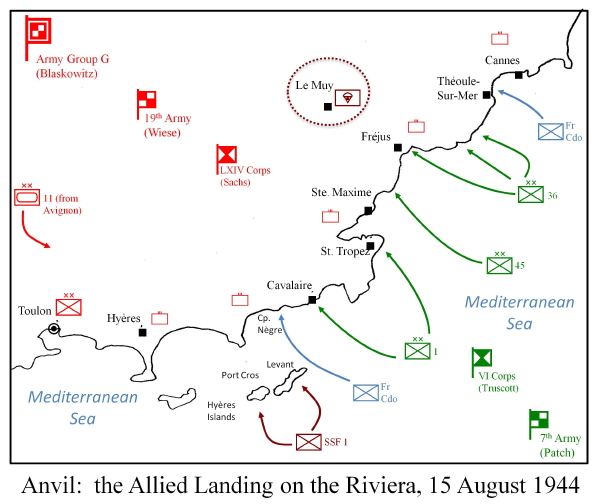Life isn’t fair, and neither is history. Indeed, some historical events—no matter how vast or significant—seem destined to be forgotten. And World War II is full of them.
Let’s say you are launching a complex amphibious invasion of an enemy-held continent in, oh, 1944 or so. You storm ashore in style, naval, land, and air assets working in full harmony, catching your opponent by surprise and brushing aside his weak attempts to stop you. On D-Day alone, you land 94,000 men and over 11,000 vehicles—an amazing achievement by any standard. Friendly casualties are minimal, and by day two your troops have pushed nearly twenty miles inland. The enemy is confused, on the run. In less than two weeks you manage to seize the largest port in your theater, a target of strategic importance that you had originally scheduled for D+40. Soon after that, you land not merely your initial assault corps, but an entire army, and then a complete army group—a massive and irresistible mechanized force that drives the beaten enemy back to his own borders and beyond. Your operation is a complete and utter triumph.
And ever since, the world has yawned.
As a card-carrying military historian™, I have to admit: I am puzzled. Clearly, we should be falling all over ourselves with enthusiasm. We should be devising new superlatives, shouting phrases like “brilliantly conceived!” and “perfectly executed!” and “Napoleonic!” We should be handing out medals all around, reserving spots in our general’s hall of fame, and writing book after book about the operational and strategic lessons of this magnificent campaign. Military historians tend to be enthusiastic by nature, and there is nothing we like more than a decisive victory.
Unfortunately, that has not been the case with the event under discussion—not even close. The perceptive reader has already figured out that I am talking about Operation Anvil, the Allied landing in the south of France between Toulon and Cannes on the Riviera coast. It put ashore the VI Corps (under General Lucian King Truscott, Jr., a hard-charging Texan who had proven himself in combat in Italy), which took the key port of Toulon effortlessly and soon thereafter drove the Germans from one of the largest ports in the entire Mediterranean, Marseille. Following VI Corps was Truscott’s parent formation, the U.S. Seventh Army (General Alexander “Sandy” Patch), and eventually the 6th Army Group, under the command of General Jacob L. Devers, another one of the U.S. Army’s sharpest and most aggressive commanders.
In other words, Anvil was not some minor or irrelevant piece of the puzzle in the Allied war against Germany. In the course of the war against Hitler’s Germany, the U.S. Army deployed two army groups in the ETO, and one of them belonged to Devers (the other was General Omar Bradley’s 12th Army Group). By that admittedly simple count, Anvil was responsible for half of the U.S. order of battle in Europe. From the beaches in the south of France, 6th Army Group drove north up the Rhône river valley and eventually fell in on the right flank of Eisenhower’s battle array as it headed into the heart of Germany. The Wehrmacht defenders never did coalesce in front of 6th AG, and there are some very fine historians today (such as David P. Colley, author of Decision at Strasbourg) who argue that Devers had a real chance to break into Germany ahead of the rest of the Allied armies, thereby shortening the war, if only Ike had recognized the opportunity that beckoned.
As important as Anvil was in the purely operational sphere, however, we can go further. “Amateurs talk operations,” the old saying goes, “but professionals talk logistics.” Marseille is an immense port, and its capture was a boon to the Allies. It would eventually account for a full 25% of all Allied supplies brought into the ETO. Think of the problems Eisenhower had supplying his armies. Then think about those same problems without possession of Marseille.
So there it is. Landing an entire army group. Capturing a world-class port. Increasing the pressure on the German defenders all along the line until they reached teh break-point. By any reasonable standards, Operation Anvil was one of the keys to Allied victory in World War II.
But like I said, life isn’t fair, and neither is history.
Next time: why Anvil gets no respect.





